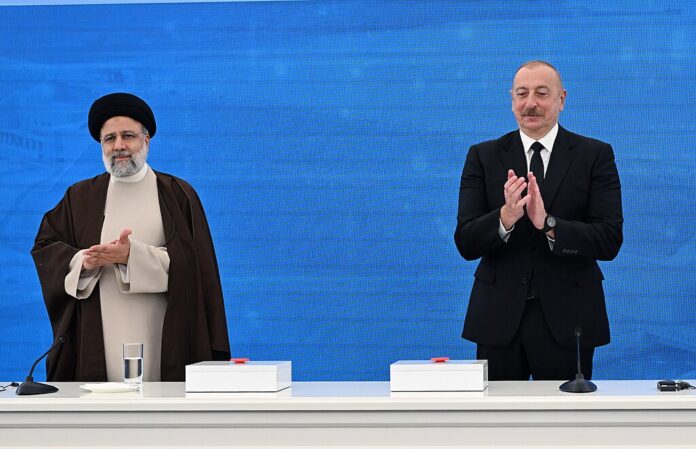Tens of thousands pay tribute to President Ebrahim Raisi and his entourage as Iran declares five days of national mourning
Tens of thousands of mourners filled the streets of Tabriz on Tuesday to honour late Iranian President Ebrahim Raisi. Raisi’s helicopter crashed en route to the city, resulting in his death along with seven members of his entourage, including Foreign Minister Hossein Amir-Abdollahian. The crash occurred on a foggy mountainside in northern Iran on Sunday, sparking a period of national mourning.
The mourning procession in Tabriz featured black-clad mourners waving Iranian flags and carrying portraits of Raisi. They walked solemnly behind a lorry transporting the coffins. The bodies were then flown to Qom, with the final destination being Tehran, where enormous banners hailed Raisi as “the martyr of service.”
A significant ceremony for the crash victims took place in Tehran. Supreme Leader Ayatollah Ali Khamenei will lead prayers at a farewell ceremony on Wednesday. Representatives from several countries, including Russia, Turkiye, and Afghanistan, will attend the funeral. The Shanghai Cooperation Organisation, led by China, also paid tribute to Raisi. Envoys from Russia, China, India, and Pakistan stood for a minute’s silence at a summit in Astana, Kazakhstan.
In Pakistan, a day of national mourning was observed. The national flag flew at half-mast to honor Raisi and his entourage. Prime Minister Shehbaz Sharif plans to visit Iran on Wednesday to attend Raisi’s funeral, accompanied by federal ministers.
In Tabriz, the atmosphere was sombre as mourners beat their chests in traditional mourning rituals. The coffin will be transferred to Mashhad in eastern Iran for burial on Thursday. Interior Minister Ahmad Vahidi vowed to follow Raisi’s path, addressing the mourners and pledging continued dedication to the nation’s service.
In Tehran, tens of thousands gathered in Valiasr Square. The Assembly of Experts, which selects or dismisses Iran’s supreme leader, held its first session since its March election. Raisi’s portrait marked his reserved seat. Raisi, a long-time member of the body since 2006, was considered a potential successor to Supreme Leader Ayatollah Ali Khamenei.
Ayatollah Khamenei declared five days of national mourning and appointed Vice President Mohammad Mokhber as caretaker president until next month’s election. The election for Raisi’s successor is set for June 28. Ali Bagheri, the top nuclear negotiator and Amir-Abdollahian’s deputy has been named acting foreign minister.
This tragic event has cast a pall over Iran, with national and international figures coming together to honour Raisi’s legacy. The nation braces for a significant transition period as it prepares for the upcoming election, reflecting on Raisi’s impact on Iranian politics and society.
Analysis:
The death of Iranian President Ebrahim Raisi marks a pivotal moment in Iran’s political landscape. His loss not only affects national governance but also has profound implications on various fronts, including political stability, international relations, and social dynamics within Iran.
Politically, Raisi’s death leaves a significant vacuum. He was widely expected to succeed Ayatollah Ali Khamenei as the supreme leader. This expectation underscored his influential role in shaping Iran’s political future. The interim appointment of Vice President Mohammad Mokhber indicates a period of uncertainty. The upcoming election on June 28 will be crucial in determining Iran’s new leadership trajectory. The political landscape will likely see intensified manoeuvring among key factions vying for power, impacting the nation’s domestic and foreign policies.
Economically, Raisi’s death could lead to short-term instability. Raisi had been navigating Iran through economic challenges exacerbated by international sanctions. His administration focused on economic resilience and reducing dependency on the West. The transition period may disrupt ongoing economic policies, affecting market confidence and economic stability. The new leadership will face the challenge of maintaining economic continuity while addressing the populace’s expectations for improvement.
From an international perspective, Raisi’s death could alter Iran’s diplomatic stance. Raisi’s foreign policy was marked by strengthening alliances with Russia and China, as well as engaging in regional diplomacy. The interim period might see a cautious approach in foreign relations until the new leadership establishes its position. This cautious approach might affect ongoing negotiations, such as nuclear discussions with Western powers.
Sociologically, Raisi’s death impacts societal dynamics, particularly among those who viewed him as a champion of conservative values. His tenure saw efforts to reinforce traditional cultural norms, impacting social policies and public discourse. The mourning process highlights the emotional connection many Iranians had with Raisi, indicating potential societal divisions in the upcoming election. The new leadership will need to balance these societal expectations while addressing calls for reform and modernization.
The death of Raisi also brings attention to minority and marginalized communities within Iran. Raisi’s policies had mixed receptions among these groups, with some viewing his approach as exclusionary. The upcoming leadership change provides an opportunity to address longstanding grievances and foster inclusive governance. How the new administration engages with these communities will be critical in promoting national unity.
Gender perspectives also come into play, as Raisi’s administration faced criticism for its stance on women’s rights and gender equality. His death and the subsequent transition offer a chance to reassess and potentially advance gender policies. The new leadership’s approach to gender issues will be closely watched, both domestically and internationally, influencing Iran’s social fabric and its global image.
In conclusion, the tragic death of President Raisi marks a turning point for Iran. The nation faces a complex period of transition, with significant implications across political, economic, social, and international spheres. The upcoming election and the actions of the interim leadership will be pivotal in shaping Iran’s future trajectory.
